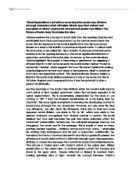Explore the use of symbolism, pathetic fallacy and metaphors in Great Expectations.
Explore the use of symbolism, pathetic fallacy and metaphors in Great Expectations.
Throughout Great Expectations, Dickens liberally employs symbolism, pathetic fallacy and metaphor and particularly in his use of weather does he emphasise and magnify Pip's emotional states, unconscious opinions, and gut feelings. At the same time, the weather also foreshadows momentous changes in Pip's life.
In Chapter 1, Dickens uses the pathetic fallacy to show characterization, mirroring the psyches of both Pip and Magwitch by creating a sinister atmosphere. Pip's name suggests that like a seed, he is small, young and vulnerable, and will grow into maturity / ‘manhood’. Amid Pip's experience with Magwitch, an uneasy climate allows Dickens to depict Pip as being defenceless and frail.
Dickens opens Chapter 1 by using the setting of a churchyard to create an eerie mood. He describes the churchyard as 'bleak' and 'overgrown', focusing on the inauspiciousness and the isolation of the churchyard during Pip's experience with Magwitch. Dickens repeats the expressions 'nettles' and 'tombstones' proposing that a churchyard is a place of torment and demise; highlighting the sinister mood of Pip's encounter with Magwitch by ingraining tension within the reader. Dickens implies that the afternoon was heading towards evening, suggesting that it was cold and fairly dark in the churchyard at the time; the darkness of the setting symbolises the mystery of the unknown, adding to the already apprehensive atmosphere.








